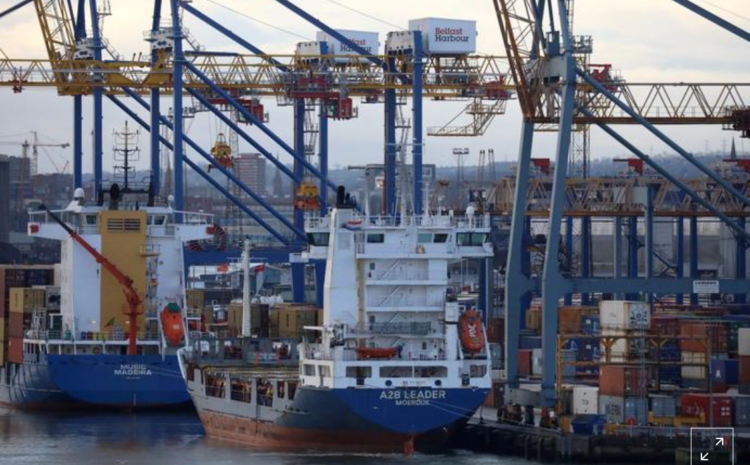British and EU officials were expected later on Wednesday to discuss how to ease the passage of goods across the customs border between Britain and Northern Ireland, after shortages and delivery disruptions sparked anger in the British-ruled region.
A month after it quit the EU’s orbit, Britain already wants changes to the rules it agreed for Northern Ireland, which it left behind in the EU’s single market and customs union. Those rules ensure no checks on goods crossing the land border between Ireland and Northern Ireland, but mean checks are now needed on goods arriving from other parts of the United Kingdom.
London feels on a stronger footing to make demands, after the European Commission briefly threatened last week to impose emergency controls on vaccines crossing the land border. The EU swiftly changed course after an outcry from London, Belfast and Dublin, but the blunder reinforced Britain’s case that the agreement needs updating.
Authorities in Northern Ireland complain that the new rules have already led to difficulty bringing in goods from other parts of the United Kingdom and shortages in supermarkets. The rules are due to get even tighter when a three-month grace period for some goods expires.
The grace period “must be extended until at least 1 January 2023,” British Cabinet Office minister Michael Gove, in charge of negotiating the issue, said in a letter to his EU counterpart Maros Sefcovic.
“If it is not possible to agree a way forward in the way we propose, then the UK will consider using all instruments at its disposal,” he added, saying that what was needed was “political, not technical, solutions”.
Gove and Sefcovic were due to hold talks on the issue along with the leaders of Northern Ireland’s two main political parties, first minister Arlene Foster of the pro-British Democratic Unionist Party, and deputy first minister Michelle O’Neill of Sinn Fein, which supports unification with Ireland.
Ireland signalled it is willing to back a longer grace period.
“From an Irish perspective we want there to be some flexibility here if it’s possible to do that,” Irish Foreign Minister Simon Coveney told RTE radio.
Trade across the Irish land border was the most contentious issue of Britain’s five-year Brexit negotiations, and the search for an arrangement to keep the border open led to the downfall of Prime Minister Boris Johnson’s predecessor Theresa May.
British supermarkets were given until the end of March to adapt their systems for customs checks. But some Northern Irish outlets have already had shortages of fresh goods usually imported from Britain, and fear the situation could worsen.
The devolved government in Northern Ireland, where pro-British unionists vehemently oppose the new trade barriers, on Monday temporarily suspended some inspections at the ports of Larne and Belfast over safety concerns.
The EU also told its officials there not to come to work because of serious concerns about their safety, caused by a rise in “sinister and menacing behaviour” in recent weeks, including the appearance of graffiti describing port staff as “targets”.
Reporting by Graham Fahy and Conor Humphries in Dublin; Kate Holton, Elizabeth Piper, Estelle Shirbon and Sarah Young in London and Jan Strupczewski in Brussels; Editing by Angus MacSwan
Our Standards: The Thomson Reuters Trust Principles

